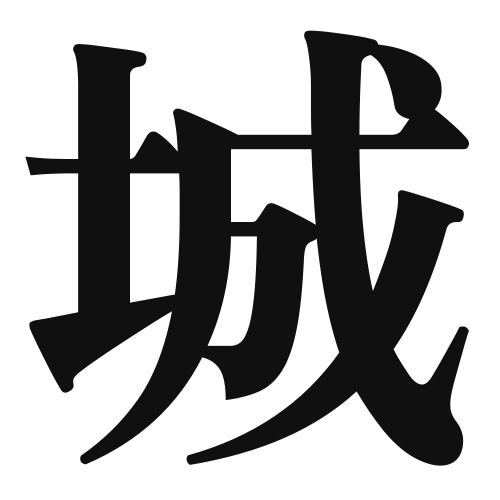1. Overview of Meaning
The kanji “城” (pronounced “shiro” in Japanese) means “castle” or “fortress.” It represents a fortified structure that serves as a residence for nobility or a military stronghold.
2. Formation and Radicals
The kanji “城” is a compound character (会意文字) that combines elements to convey its meaning. It consists of the radical “土” (meaning “earth” or “ground”) at the bottom, which signifies the foundation, and the character “成” (meaning “to become” or “to achieve”) at the top, suggesting the idea of building or creating something significant on the ground.
The radical “土” is essential in many kanji related to earth and land, emphasizing the connection between castles and their physical locations.
3. Examples of Usage
Common words and phrases that include “城” are:
- 城壁 (じょうへき, “jōheki”) – castle wall
- 城下町 (じょうかまち, “jōkamachi”) – castle town
- 天守閣 (てんしゅかく, “tenshukaku”) – main keep of a castle
Example sentence in daily conversation:
「あの城はとても美しいです。」(あのしろはとてもびじんです。) – “That castle is very beautiful.”
4. Synonyms and Antonyms
Similar kanji with related meanings include:
- 砦 (とりで, “toride”) – fort or stronghold, which is typically smaller and less grand than a castle.
- 館 (やかた, “yakata”) – mansion or large house, which does not have the defensive connotation of a castle.
Antonyms include:
- 平地 (へいち, “heichi”) – flat land, which contrasts with the elevated and fortified nature of a castle.
5. Cultural and Historical Background
The concept of “城” is deeply rooted in Japanese culture, reflecting the feudal system where samurai and lords built castles as centers of power and governance. Many castles, such as Himeji Castle, are UNESCO World Heritage Sites and symbolize Japan’s architectural heritage.
Proverbs and idioms related to “城” include:
- 「城を守る者は、城を攻める者を知るべし。」- “Those who defend the castle should know those who attack it.” This emphasizes the importance of understanding one’s adversaries.
